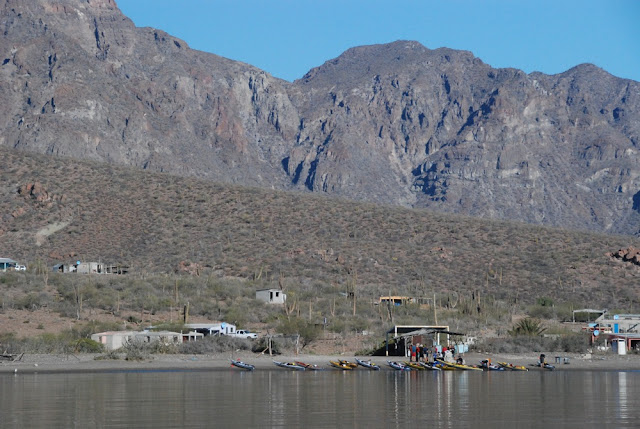Thursday, Mar 22
 |
| Kayaks in front of the San Evaristo store after the norther. |
Having waited out the norther in the great company of other San
Evaristo cruisers we were delighted to wake up to a calm morning, so calm, in
fact that by 8 a.m. kayakers had already arrived at the beach and were
stripping down to get ready for some warm shore time. They must have had a long
wait stranded somewhere, as the wind had blown up great foamy waves for 3 days.
 |
| Whales are hard to photograph so we put in 2 shots. |
Weighing the hook at about 9:30, the last of our little Ague Verde bound fleet, we powered over calm seas to the turn at Punta Marcial. There
Charlie called me up from a nap and lo, lolling along very close beside us we
saw blue whales, a mother and calf. Again it struck me how far down the back is
their tiny fin.
Arriving in Agua Verde we headed for the northern anchorage inside a spit fully occupied by birds.
 |
| Susie, Diane and Dianne hold up crafty silverware in Prairie Oyster's cozy cabin. |
Friday started with a great craft sharing in the cabin of
Prairie Oyster with Dianne showing Diane Marsh and me how to wire beads from
her astounding collection onto the handles of thrift store silverware. I did
some knitting on the current hat.
After a while we got organized to walk to town via the beach
route under puddingstone like overhangs. Very cool. The beach there had shells
I hadn’t seen before, though the worn down pieces were common off San
Evaristo’s salt ponds. These shells grow up to an inch in thickness. I picked
up a conch that probably weighed half a pound. We wondered where they came from
to have such rugged design. So far no living shellfish have been seen here.
 |
Maria took about an hour to make our 48 tortillas, frying
each one on a square of metal on her front burner.
|
Eventually we found ourselves heading toward the village, up
a sandy arroyo plain with a few palms, acacias and other desert trees. Actually
this settlement had about 300 residents, and many goats, chickens and even
turkeys. There was notably more shade and water. Efforts to cultivate the
landscape stand a chance here. We saw bouganvilia and wooden poles used for
animal corrals, unlike in San Evaristo. I learned that recently the residents
have started to farm a bit, raising their own vegetables.
photo
We visited Maria whose orderly two room house advertised
tortillas. She informed us that she would make them to order so we ordered a
couple of kilos and walked on to the store for more queso fresco, made in the
village. To my surprise they had coolers full of veggies and meat as well. Good
fortune, as we were out of meat except for machaca (dried grated beef). This
town is about 25 miles from Route 1 by mostly dirt road making fresh food
deliveries a more reliable occurrence than in San Evaristo.
After the hot walk back we scrubbed the bottom and made machaca burritos with our fresh tortillas for the crowd gathered on Salish Sea for drinks. What a day!
 |
Charlie works hard to make sure we get the most out of our solar panels.
Also of note is the cutter jib cover I made in La Paz, jib hanked on and ready!
|
Saturday morning’s calm invited a little rowing around the
anchorage to visit the birds, not a big variety of species but oystercatchers
flew by noisily and a Brandts cormorant was out. We’ve been amazed by the
convenience of watching pelicans right next to our boats. Instead of plunge
diving into the water as usual, they scoop up little fish in their ballooning
pouches and then drain out the water while the bill is tipped down. The gulls,
especially young Heermans, hang around, swimming close to a chosen pelican
friend in hopes of a stray nibble. The water had cleared up and we could see to
the bottom. There are good fish to be caught here but so far Ian, the
fisherman, has been skunked.
 |
| Now you see why it's called Agua Verde. Gratitude farthest boat. Salish Sea nearest. |
Later we visited a third beach, this one on the south side
on the cove. It had less litter and flotsam but great shells. I picked up pearl
oyster shells I think with lovely pearly grey nacre. The pearl business
collapsed years ago, but probably the oysters will rebound if left long enough.
Charlie meanwhile stayed aboard stoking the batteries and working on his Seaweed
Blaster movie. Mark I was a hit with the San Evaristo crowd. Soon it will go
viral no doubt, if he can just get it to the web!
 |
| Cemetery near the anchorage |
At night we endured the grating of our anchor chain being
dragged over rocks. Charlie did check the snubber on the anchor chain which
normally dampens the pull and eliminates sound transfer. He thought it was
connected, but it wasn’t. Bad for
sleeping. In the morning we climbed a rocky dry trail to “the other side of the
mountain” just to take a look. The little cemetery at the bottom had few
graves, none later than the early 60’s when quite a number of deaths occurred.
There was a tiny settlement, or at least houses, visible in the next arroyo.
Living here can be such a struggle.


No comments:
Post a Comment